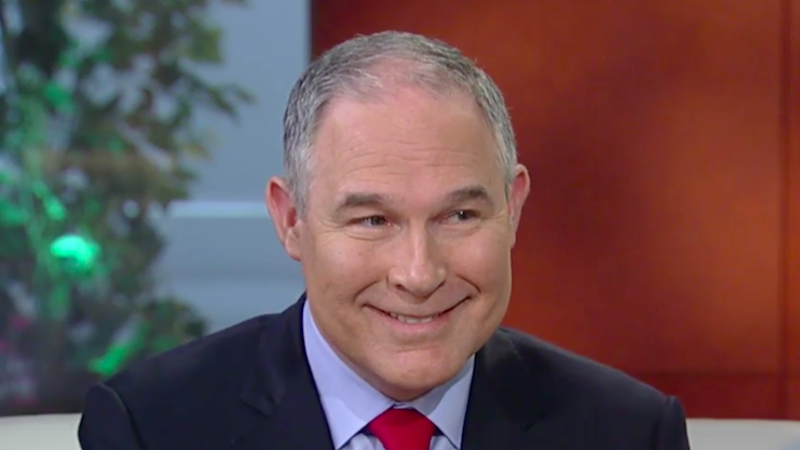Environmental Protection Agency (EPA) boss Scott Pruitt has said the US should withdraw from the Paris climate agreement.
Speaking to Fox and Friends on Thursday morning, Pruitt said the Paris deal was “something we need to exit, in my opinion. It’s a bad deal for America.”
It is the subject of an internal battle in the Trump administration, with secretary of state Rex Tillerson calling for America to keep a seat at the table. Donald Trump is set to make a decision by the end of May.
Pruitt, whose agency would be responsible for enforcing rules to cut emissions, argued that staying in the deal opened the US up to outside pressure.
Pruitt said: “The people who say that it’s not enforceable, every meeting I’ve had with my counterparts from Germany, Canada and others, the first question they ask me with is: ‘what are you going to do to comply with Paris?’ And so what that means is contracting our economy to serve and really satisfy Europe and China and India. They are polluting far more than we are. We are at pre-1994 levels, with respect to our CO2 emissions.”
Asked by host Brian Kilmeade: “So you tell them, listen we’re not going to do that [risk the economy]?”
Pruitt responded: “That’s exactly right.”
Asked to confirm that Pruitt had told other nations that the US would not subject its economic interests to the Paris accord, an EPA spokesperson told Climate Home: “Administrator Pruitt has been very clear in multiple interviews that he believes Paris has been a bad deal for this country, but has always reaffirmed his belief that it’s important to be engaged in international dialogue, and to represent American interests there.”
The German and Canadian environment agencies have been contacted for comment.
The Paris agreement allows for countries to set their own timelines for emissions reductions, relying on peer pressure and diplomacy to increase ambition over time. There is no system to punish countries that fail to meet their targets.
Weekly briefing: Sign up for your essential climate news update
In 2015 in Paris, the US undertook to reduce its greenhouse gas emissions to 26-28% below 2005 levels by 2025.
But Pruitt said the deal had been unfair for the US: “America was put last. The previous administration went in to Paris and said that China and India had no obligation until 2030 and America was going to cost itself jobs.”
Developing countries such as China and India, which bear far less responsibility for the carbon already in the atmosphere, argue that they deserve the chance to grow their economies using fossil fuels and that rich countries like the US should cut their emissions earlier.
Climate Action Tracker, an organisation that measures the ambition of countries’ pledges to Paris, ranks all three countries as “medium”.
Pruitt’s comment that China and India have “no obligation” until 2030 is incorrect. Despite both continuing to grow their emissions into the 2020s, their pledges do require immediate policy action in order to begin slowing down and reversing their emissions growth.
He also falsely claimed that Europe, China and India were all “polluting far more than we are”. Only China emits more CO2 than the US. According to tracking data released by the World Resources Institute this week, India’s emissions remain roughly half those from the US and the EU’s emissions are about two thirds. On a per capita basis, the inequality is stark: a US citizen has more than eight times the carbon footprint of an average Indian.
During his confirmation hearing, the former Oklahoma attorney general told the senate that the measurement of human impact on the climate was “subject to continuing debate”. During his time as attorney general, Pruitt was caught lobbying the EPA on behalf of fossil fuel companies who had contributed to his campaigns.
